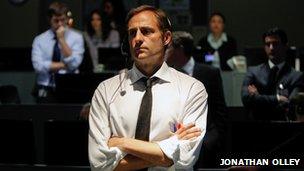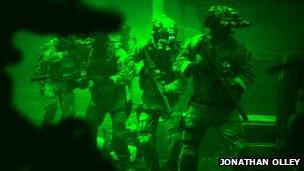Jessica Chastain: Zero Dark Thirty 'forces audiences' to question
- Published
Jessica Chastain: "This film is 100 per cent not pro-torture"
Hollywood actress Jessica Chastain is flying high - her new film Zero Dark Thirty has just landed her a second Oscar nomination and she is enjoying a successful run as the lead in The Heiress on Broadway.
And if that's not enough, she's also starring in low-budget horror Mama, which is currently sitting at the top of the US film chart, with Zero just behind in the second spot.
Not bad for someone whose first major full-length feature - The Debt - was only released in 2010.
"It's incredible. My movies have only been out for two years and to think of what's happened in the past two years. Every day I kind of stop and think 'What's happened in my life?'"
In fact, Chastain notes that is not the first time two of her films have been placed first and second on the box office chart - the same thing happened with The Help and The Debt in 2011.
"For a long time I was hearing that studios didn't want to make films with female leads because they didn't think they would make any money," she says. "Maybe this is showing a new trend - audiences are interested in everyone's story, not just the story of the few."
The actress is currently juggling the demands of film publicity, awards ceremonies and her stage role.
"There's nothing more humbling or grounding, no matter how much attention you get in LA at an awards show, to be on the stage in front of 900 people - you have to bring it to that moment fully, and if you don't, they'll let you know."
Kathryn Bigelow on her Oscar snub
Chastain's first Oscar nomination was for best supporting actress in The Help last year.
She lost out to her co-star Octavia Spencer but no-one would be hugely surprised if she took home the golden statuette this year for her role as CIA agent Maya, who spends the best part of 10 years tracking down al-Qaeda leader Osama Bin Laden.
Chastain is particularly pleased that Zero Dark Thirty offered her such a meaty female role.
"It's very rare to play a character defined by her work and not her male counterpart," she says.
"I think it represents this generation of women who are independent and capable and strong and not the product of something else - the girlfriend or the victim of the villain of the piece. It's really exciting to play a woman who's smart and intelligent and who uses her brain."
The film's Oscar-winning director Kathryn Bigelow agrees.
"As we began digging into this story, I realised there were a lot of stats about how many women there are in the intelligence community," she says.
'Core of iron'
"If the research had shown there was a man at the centre of this piece, it would have been a man. But the fact it was a woman was fascinating to me."
As a film director, Bigelow herself is used to working in a man's world - in 2010 she became the first woman to win a best director Academy Award for The Hurt Locker.
Mark Strong, who plays Maya's Washington-based CIA boss, described working with Bigelow as "fascinating".

Strong was cast by Bigelow after she saw him in Tinker, Tailor, Soldier, Spy
"I knew her as a woman who made films that were largely about men, testosterone-fuelled action kind of movies. She's a lovely lady but she has this core of iron that enables her to be a film director."
Maya, too, is an extremely driven character but she is something of a mysterious loner and the audience is left to guess where her motivation comes from and what kind of background she has.
"It wasn't difficult to play a character that doesn't speak her subtext because I do so much preparation before I get on a film set. I had three months to flesh out who this woman was," says Chastain.
"Maya doesn't have a scene where she goes, "What if I'm wrong? What if I put people's lives in danger?' So I had to show that with my eyes."
The film, based on first-hand accounts, has not been without controversy, particularly regarding early scenes in which a detainee is tortured by a CIA agent.
Zero Dark Thirty has drawn criticism from within the US government with some senators complaining it perpetuates "the myth that torture is effective".
Bigelow is quick to say this is a "misrepresentation".
"The most critical piece of information (leading to Bin Laden's whereabouts) is a name found in a file that had been in existence in the CIA since 2001."
The film has five Oscar nominations but Bigelow missed out on a best director nomination, which many have described as a snub from the Academy.

Zero Dark Thirty is US military slang for the early morning hours, when the raid on Bin Laden's compound took place
When asked if she believes the reason for her omission is because of the torture debate, she says: "I think the controversy has been the controversy. Yeah, I think so."
Chastain says the film "forces the audience to ask 'Where have we been and where do we go from here?'"
"Because she (Bigelow) doesn't put her personal opinion (in)... and lets the audience decide, it's an easy film for someone to take and change for their own gains," she explains.
And screenwriter Mark Boal, a former investigative journalist who spent "80 hours-plus a week" knocking on doors in Washington DC to find sources for the film, says he has "no regrets at all".
"I stand by the film. I didn't know there were such strongly opinionated movie critics in the US Senate but apparently there are and they have a job to do and with respect to national security, that's important. But it's very different to my job.
"I think we did a pretty good job with the story."
Zero Dark Thirty opens in UK cinemas on 25 January.
- Published23 January 2013